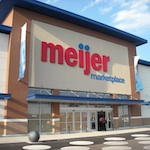At a Glance
Company headquarters
Milford, OH
Construction/facilities employees
2
Average remodel duration
7–9 weeks
Current locations
250
Since the first Penn Station East Coast Subs location opened with a menu of just four sandwiches in downtown Cincinnati in 1985, the business has ballooned to 250 franchised locations in 13 states, keeping its construction team working steadily to help maintain a consistent experience for customers chain-wide. One of the people at the head of this team is Kirk Durchholz, the vice president of construction, whose more than 16 years with the company have given him keen insight into the best approaches for brand cultivation. He now has his hands in nearly every aspect of Penn Station, Inc.’s new builds and renovations, and his extensive oversight protocols and strategies help protect the chain’s identity while facilitating financial efficiency.
Most important to Durchholz’s efforts are the precise store templates and specifications that he and Penn Station established—and which he closely monitors. Everything from floor tiles to rooftop materials to kitchen equipment is included in the spec package. “We establish a protocol, through plans and specifications, regarding the physical plant and all FF&E [furniture, fixtures, and equipment], which prohibits any deviation without written permission of Penn Station, Inc.,” Durchholz says.
These specs are crucial to his management of consistency from store to store, and they assist the business’s 70-plus franchisees in controlling the construction costs for new locations from start to finish. “One thing I put a lot of credence in is the fact that we’ve got a set of plans and specifications that are so exacting in their standards that the franchisees don’t experience exorbitant cost overruns on jobs,” Durchholz says. “The scope of each project is clearly defined, without exception.”
Franchisees aren’t required to purchase all construction goods and services from Penn Station’s preferred suppliers, but, again, Durchholz says, “We make it so cost-effective and user-friendly [that] it doesn’t make sense for the franchisee to outsource.” Also, franchisees don’t usually want to do the work of locating a supplier, confirming that its products match Penn Station’s specifications precisely, and conducting their own cost negotiations. “Our franchisees are buying into a profitable business,” he adds, “and they know we’ll help them manage the process.”
Durchholz himself does significant work for each new sandwich shop. First, he evaluates and updates the project’s plans and specifications before putting them in the hands of franchisees, preferred suppliers, and general contractors. “Before they go out, I edit those plans to make sure they’re in compliance with our latest specifications and prototypical design intents,” he says. “And, I track the problems and nuances tied to each particular demographic area to alleviate any ambiguity associated with that project.”
Instead of selecting the contractors for each project directly, Penn Station has the individual franchisees choose and hire them. But, Durchholz still interviews those chosen before he approves them to bid on the project, and during the interview he ensures that the contractors have the proper restaurant-construction experience. He also double checks their knowledge of code requirements and restrictions in a shop’s particular area.
Durchholz always goes on field visits, too, usually a week before the contractors apply for occupancy permits. “We compile our findings and make note of anything that is either incomplete or may deviate from the prototypical spec,” Durchholz says. Those items are brought to the attention of both the contractor and the franchisee, and resolving any issues is the responsibility of the franchisee.
Such a controlled process ensures that Penn Station’s sandwich shops typically go up without a hitch. And as the brand continues to expand, Durchholz will continue to work to maintain its image. ABQ
___________________________

Meet Kirk Durchholz
Where did you go to school?
In 1973, [at the age of 16], I was already an apprentice working for a carpenter contractor.
What was your first construction job on your own?
At 19 years old, in 1976, I was a self-employed residential carpenter subcontractor.
How did you wind up working for Penn Station?
By 1984, I had established a reputation as an expedient and cost-effective commercial restaurant contractor. In 1990, Jeff Osterfeld, the CEO of Penn Station, saw my business card and recognized my name because he and I went to the same high school. That year, I was contracted by Jeff to conduct a tenant finish for a Penn Station restaurant in the Castleton Square Mall in Indianapolis. The project was a success, completed in record time and within budget. Jeff contacted me in 1995 and proposed we consider working together. In 1996, I took the full-time position, and I’ve been a member of Penn Station ever since. This is a top-notch organization—a special way of life.
What personal goals do you have in your current role?
Commitment to my profession in the early years prohibited me from spending quality time with my own kids. I’m committed to spending more time with my grandchildren. I’m also planning on giving back to this great industry someday by becoming a mentor for the upcoming generation of younger people driven by the pursuit of excellence.


